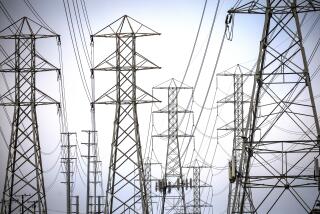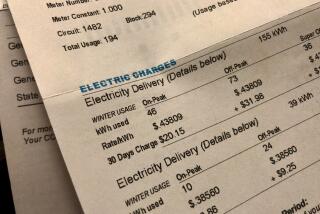Auditing Home Utility Bills Can Pay Off
- Share via
When Larry R. Etherington decided to audit his home utility bills, he didn’t find many errors. Nevertheless, he was able to save nearly $300 annually on his electric costs.
And Etherington, who is president of Utilities Auditing Services in Phoenix, maintains that many consumers would be able to realize similar savings by investigating their options and, possibly, making a few minor alterations in their utility usage.
These changes vary from minor items, such as having the utility switch a consumer to another rate schedule, to relatively major changes, such as replacing utility meters and converting appliances to cheaper sources of energy.
Whether such alterations make sense depends on an individual family’s circumstances and utility usage. But, considering that the savings can be substantial and the work involved is slight, they’re probably worth investigating.
Here are a few items to check for:
* Electric bills. Many people are unaware that most electric companies have several different rates. Commonly, consumers will be automatically placed on the standard rate, which bills them for the total kilowatt hours used during the month. However, those who don’t use their electric appliances much during peak hours might be better off going to “demand rates,” Etherington said.
Utilities that offer demand rates base these rates on the customer’s highest usage during the day. Those who turn on the TV, lights, washing machine and electric oven the moment they come home from work would find their demand rates high. But those who space out their electric usage during the day may be able to save substantial amounts.
Consumers who are unsure whether they can save by switching to a demand rate need only to call their electric company and ask. Usually, the company will be able to look at a computerized analysis of an individual customer’s past electric use and tell them which rate would cost the least, assuming that usage remains constant. Etherington estimated that he personally saved $293 by switching to the demand rate, while one of his colleagues saved about $660. The entire process took five minutes, according to Etherington.
* Water rates. Many water companies bill consumers for usage plus a monthly service charge that is based on the size of the consumer’s water meter. The monthly service charges vary from about $5 for a 3/4-inch meter to as much as $150 for a six-inch meter, Etherington said. If consumers have a meter that’s larger than they need, they might consider replacing it with a smaller one to take advantage of the lower monthly meter rate.
* Sewer charges. Sewer fees are often based on the amount of water a family uses. But those who use a substantial amount of their water to fill pools, wash cars, water lawns and trees--uses that skirt the sewer system--might consider installing a separate meter for their sewer, Etherington suggested. The installation could be costly, but if sewer fees are substantial and a large portion of the consumer’s water is not reclaimed through the sewer system, it still might make sense.
* Gas bills. Many gas companies provide cash rebates for consumers who switch over to gas appliances. Those who are considering a switch should contact their gas company to see if these rebates, which can amount to hundreds of dollars, are available.
* Phones: Now that dozens of long-distance phone companies are competing for business, consumers can benefit from shopping around. The best way to shop is to go through several monthly phone bills and highlight frequently made long-distance calls. Then check with the competing phone firms to see what they would have charged for the same calls made at the same time of day. What individuals should not do is assume that they will alter their phone usage to suit a company’s cheapest programs. Those who go to sleep at 9 p.m., for example, gain no benefit from a 50% discount on calls made after 10 p.m.
* General. Converting electric appliances to gas can frequently save money in the long run. Gas dryers, stoves and water heaters are often more energy efficient than similar electric appliances, and gas is frequently cheaper to use than electricity.
Rebates and financial incentives are also sometimes available to consumers who insulate their homes or who use alternate sources of energy--such as solar heating.
Consumers should realize that utility companies are usually willing to help their customers save. All you have to do is ask, Etherington said.
More to Read
Inside the business of entertainment
The Wide Shot brings you news, analysis and insights on everything from streaming wars to production — and what it all means for the future.
You may occasionally receive promotional content from the Los Angeles Times.









